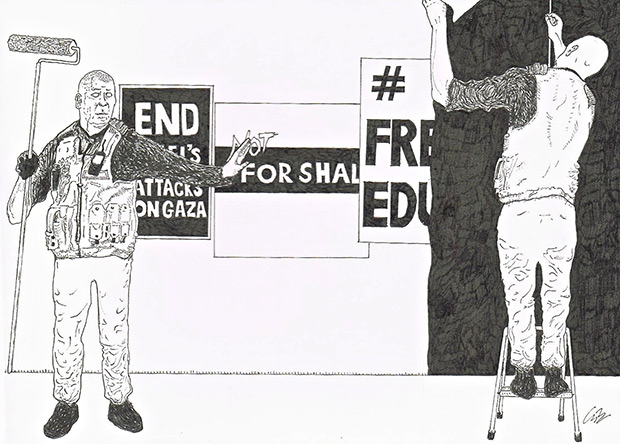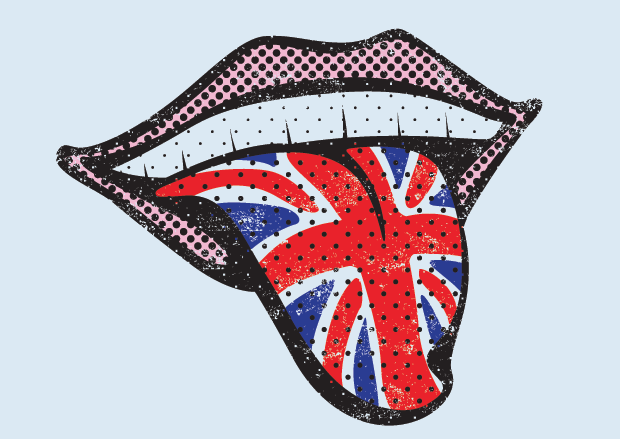Free thought on campus: nothing to see here

This article was posted on 8 Dec 2014 at indexoncensorship.org

This article was posted on 8 Dec 2014 at indexoncensorship.org

Khadija Ismayilova
The arrest of Azerbaijani investigative journalist Khadija Ismayilova today underscores the entrenched authoritarian instincts of the government of President Ilham Aliyev. Ismayilova was sentenced to a two month pretrial detention.
“The arrest of Khadija Ismayilova is part of Azerbaijan’s continued crackdown on free media and civil society. This confirms the pattern of intimidation and harassment perpetrated by authorities in an attempt to silence critical voices,” Melody Patry, senior advocacy officer at Index on Censorship, said.
Ismayilova’s arrest follows the earlier detentions of human rights defenders Leyla Yunus and her husband Arif Yunus; free speech advocate Rasul Jafarov; journalists Seymur Hezi, Parviz Hashimli, Nijat Aliyev and Sardar Alibeyli; and bloggers Omar Mamedov, Abdul Abilov and Rashad Ramazano. The country has starved the 2014 Index award winning Azadliq newspaper of resources, forcing it to suspend its print edition. The charges against all of the detainees range from hooliganism to illegal storage and sale of drugs.
Today’s action by Azerbaijan’s authorities also drew immediate criticism from Human Rights House Foundation Executive Director Maria Dahle and the OSCE Representative on Freedom of the Media Dunja Mijatović.
“This sentence does not come as a surprise: we assumed the authorities wanted to silence Khadija Ismayilova,” said Dahle. “The arrest has a chilling effect: one must now consider that every independent civil society leader in Azerbaijan is a target and can be arrested at any given time for any charge, as ludicrous as one can imagine. The international community, especially the Council of Europe, must now get a foot in the door to stop the repression, including by stopping further cooperation with Azerbaijan’s authorities”, Dahle added.
“The arrest of Ismayilova is nothing but orchestrated intimidation, which is a part of the ongoing campaign aimed at silencing her free and critical voice,” Mijatović said.
On Friday afternoon, Ismayilova’s usually very active Facebook page was also inaccessible.
Azerbaijan, which spends significant amounts on media relations, presents itself as a modern nation. But behind the smokescreen, the country has been carrying out a systematic suppression of civil society, journalists and independent media.
This article was posted on 5 Dec 2014 at indexoncensorship.org
Bahraini human rights activist Zainab Al-Khawaja has been sentenced to three years in prison for “insulting the king”.
The verdict was handed down by a Manama court on Thursday, and also included a fine of 3,000 Bahraini Dinar (£5,000). She was on trial for tearing up a photo of King Hamad bin Isa Al-Khalifa at an October court date where she faced charges connected to previous rights campaigning. This comes only days after she gave birth to her second child.
The Al-Khawaja family have been heavily involved in Bahrain’s pro-democracy movement, and have been continuously targeted by authorities in the constitutional monarchy.
Al-Khawaja’s father Abdulhadi Al-Khawaja has been serving a life sentence since 2011 for the role he played in the country’s ongoing protest movement which started that year. Her sister Maryam Al-Khawaja boycotted the recent court hearing which saw her sentenced to one year in prison on what is widely acknowledged to be trumped up charges.
This article was posted on 5 Dec 2014 at indexoncensorship.org

(Illustration: Shutterstock)
Who decides what is acceptable behaviour? And what is not? What is mainstream and what is radical? Who can speak and who must be silent?
At the moment, British authorities have found themselves engaged in a frenzy of defining what is acceptable and what is not, well beyond the bounds of the law courts. The government’s new counter terror bill has put the onus on public bodies to prevent individuals from becoming radicalised. The measure is clearly aimed at university campuses, which have come under increased scrutiny due to the unchecked presence of organisations such as Hizb Ut Tahrir, a group that has been calling for the rejection of secular democracy in favour of an Islamic Caliphate long before it was popular.
There is no legal sanction for failure to perform this duty, but the vagueness of the proposed law should worry everyone: there is no attempt to define what “radicalism” might mean. In the days before the UK took Islamism seriously, animal rights radicals were seen as a threat to peace. Before that, Irish republicans, and so on. As recent revelations on police surveillance have shown, everyone from activists to comedians to bereaved mothers can be cast as potential enemies of the state.
A recent example should give us pause for thought. Former English Defence League leader Tommy Robinson spoke at Oxford Union on 26 November. Robinson, currently on licenced release from prison, claimed at the beginning of the talk that he had been warned by police that there were certain things he could not say, lest he find himself back behind bars. Not, apparently, issues that could, for example, have constituted contempt of court, or the other limitations most of British society accepts. Merely opinions.
This is bad enough, but with the new counter-terror measures, could university authorities have put pressure on the union not to host their speaker of choice at all? (You may say the union is independent of the university, but it still has the power to sanction students).
What does this matter to you? You are not Tommy Robinson, and you may not even think he should be allowed to speak at the Oxford Union, or anywhere. You believe Tommy Robinson is a bigot, and plain wrong, so what’s the problem?
But think for a moment.
You’re a good person, aren’t you? I mean, at least you try to be a good person, I’m sure. You’d never throw your sandwich wrapper out of the car window. You certainly wouldn’t steal, or cheat at board games.
And you’re definitely not a bigot. You might, at certain times, find yourself applying certain stereotypes to the people you see around yourself, but your internal Jiminy Cricket, or whatever Disney avatar keeps you in line, will soon correct that. You might every so often laugh at jokes about people of other races or religions, but that’s because you understand the context. You can laugh at these things precisely because you are not bigoted: you are laughing at racism, not with it.
You might, occasionally, get frustrated at the apparently new-fangled language of online social justice activists, but you realise this is probably your fault more than theirs. You’re all right.
What if you’re not, though? What if you woke up one day, the world had tilted 180 degrees, it was summer when it was supposed to be snowing, and you were all wrong? About everything. Puppies are there to be poked, pensioners exist solely to be mugged by those younger and fitter than them, and overt, aggressive racism is not just condoned but encouraged.
This is not to suggest a moral equivalence between racism and anti-racism, or political correctness and bigotry. Because there is none. Not being a bigot is clearly better than being a bigot.
But it is a useful, simple thought experiment to carry out whenever one is tempted to excuse censorship, or even support it: what if my apparently good, apparently sensible positions were the one seen as utterly beyond the pale, and those of the person who is now being censored were the ones that held sway?
It is perhaps a refusal to recognise this idea that leads to the often-used phrase, “this isn’t a free speech issue”. Shutting down a debate on a university campus? Not a free speech issue, but about safe spaces. Calling for a television programme to be cancelled? Not about free speech, but about appropriate channels for expression.
Anti-censorship campaigners are often portrayed as “free speech fundamentalists”, but in fact, a genuine sense of doubt is what should motivate all defences of free speech. You have to ask yourself time and time again: what if I was seen as completely wrong? Would it be better to have a society where people argued against me, however vehemently and vigorously? Or would I prefer a society where the government, the police and the courts were entitled to decide what I should and should not say?
This article was posted on Dec 4, 2014 at indexoncensorship.org